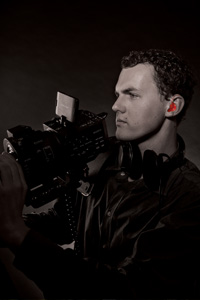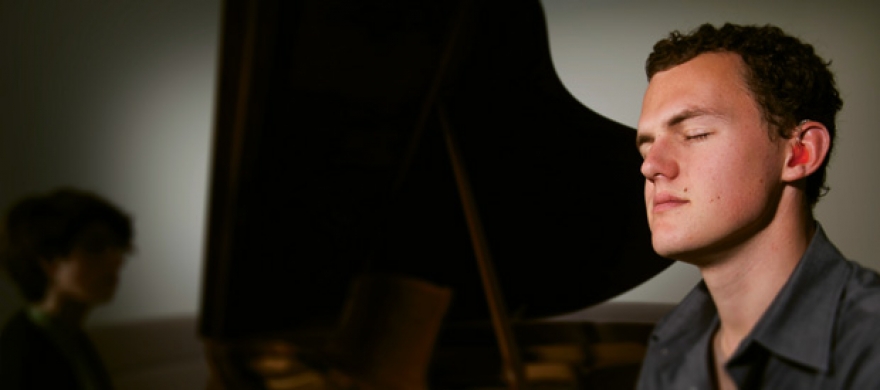Sounds Profound
A young filmmaker hears music for the first time and discovers the final piece of his puzzle.
Austin Chapman (’11) considers himself fortunate. He has access to something that 90 percent of the world’s population does not: pure, absolute silence.
“I don’t know why God blessed us with eyelids but not ‘earlids,’” he says. “People laugh when I tell them I feel bad for hearing people, but if they tasted silence they wouldn’t be laughing.”
Chapman was born profoundly deaf and, until last August, had relied on a particular hearing aid to amplify most sounds. But when he tried a new technology—the Phonak Naida S IX UP—he wasn’t prepared to hear, for the first time, the cacophony of sounds that slip into most peoples’ subconscious.
“When my aids are off, I’m thrown into a world of utter silence,” he explains. “The absence of sound is my favorite thing to ‘hear,’ because I feel much more clear- minded and able to escape into my world of the stories I’m constantly building and editing, even more so with my eyes closed.”
While Chapman’s new hearing aids have opened his world to hearing and understanding the nuances of everyday sounds, they have transformed the way he approaches his passion and profession: filmmaking.
As a first grader, Chapman was unable to hear a sound and could only communicate with his interpreter. None of his classmates knew sign language, so he turned to novels and film for entertainment. By the fifth grade, as his speech improved, he began making short films with his best friend Taylor Bonin; the first was a spoof of the local nightly news broadcast. They now work side-by-side at Art of the Story, a production company and accompanying website that Chapman launched in 2011, with Bonin serving as the director of photography.
“Even though I wrote all of our shorts, I never dared to dream of directing, because up until the time I went to college, I could not communicate well with strangers,” notes Chapman. “Writing was the only creative option I saw, so I focused on that.”
It was at Pepperdine that he was able to tap into years of creativity and share them out loud. His first opportunity came by way of the annual student-run REEL Stories FilmFest, where he won the Excellence in Cinematography Award for At the Altar, a film about a boy sentenced to execution and the circumstances that led him to that moment, all told in flashback.
“That experience was the first moment I realized I loved the process of creating a film as much as writing and resolved to better myself as a director, editor, producer, actor, cinematographer, and writer,” he recalls.
For the competition the following year Chapman produced City of Widows, a documentary about what happens to young women in India after their husbands die, and Eleven Eleven, a hauntingly beautiful film about a young, hearing-impaired man who finds his soul mate and loses her to death the next day. The former won the REEL Cause Award and the latter won the festival’s Grand Prize and the Audience Award at the second annual event. “That experience cemented my drive to create beautiful stories using the lyrical language of film. I lost my fear of failure and found a new one: not trying hard enough.
Still, deciphering and applying music to his shorts remained the missing link in his filmmaking. “Film is an amalgamation of storytelling mediums: novel, theatre, photography, and music. Up until now, I have built my stories using three of the four. I left the music up to my composer and could only give information—not feedback."
In the past Chapman would outline specific emotions that scenes called for and relied on his circle of friends to consult and critique his work. “The composer built the soundtrack from scratch and we would all go back and forth with edits to perfect it. Now, with the new world of sound, I can visualize the music from the inception of the story and even build the spine of the soundtrack with my composer. I never thought I would have this ability and am extremely grateful, because music is such a beautiful medium to convey emotion just as the other ones, but in a completely different way.“
 “I can hear music for the first time ever, what should I listen to?” Chapman inquired
of the web audience via Reddit last summer, seeking to broaden his sound comprehension.
Eight months and over 14,000 comments later, Chapman has compiled a playlist of tunes
that spans centuries, from the origins of music to more current and popular genres
(see box for some of his favorites).
“I can hear music for the first time ever, what should I listen to?” Chapman inquired
of the web audience via Reddit last summer, seeking to broaden his sound comprehension.
Eight months and over 14,000 comments later, Chapman has compiled a playlist of tunes
that spans centuries, from the origins of music to more current and popular genres
(see box for some of his favorites).
Yet, perhaps topping them all is still Mozart’s Lacrimosa, a haunting composition that moved Chapman deeply upon first listen. “I was blown away by the beauty of it,” he recalls, of being introduced to the requiem song in a car full of friends. “At one point, it sounded like angels singing and I suddenly realized that this was the first time I was able to appreciate music. Tears rolled down my face and I tried to hide it, but when I looked over I saw that there wasn’t a dry eye in the car. I finally understood the power of music.”
Before switching hearing aids, Chapman had much lower expectations of what music would sound like. He had, throughout his life, been exposed to a “garbled and distorted version of the real thing,” mostly bass tones and vibrations, and the first thing he noticed was the clarity and frequency of the tones. “I could have never prepared myself for the beauty of music. That was the first thing that threw me over.”
“My old hearing aids gave me a general picture of how words sounded, but mostly only for sounds on the low end of the frequency spectrum,” explains Chapman, who did not have the ability to hear himself at all and worked with a speech therapist to educate himself how to communicate verbally. “With my new hearing aids, I can hear higher tones than I’ve ever heard and my communication and understanding improves at a dramatic rate with every passing day.”
Now, Chapman is keenly aware of sounds that hearing people barely notice: the whirring of a ceiling fan, the hum of traffic, even the sound of a flushing toilet. “That’s just additional information my brain has to process and I’d rather focus on my train of thought,” he explains. “I’ve started turning my hearing aids off more often than before, because I can’t stand hearing every single noise in a quiet room.”
Adjusting to this transition has been difficult as Chapman learns to separate sounds. His greatest challenge is understanding the sounds he hears, memorizing how they sound, and associating those sounds with their corresponding words.
“One common misconception is that I can suddenly understand all the lyrics a song. Imagine someone born blind who gained the ability to see later in life. If you gave that person a book, he would be able to see it, but would he understand? Absolutely not.
Just as the eye focuses on one subject, I must learn to do the same with sounds. Right now, the more overlapping sounds, the more difficult it becomes. I’m training my brain every day and am already making progress.”
With his new hearing aids, Chapman is now able to focus on parts of filmmaking and
storytelling that were out of his reach for so long. “The best way I can describe
it is that before I could only see the tip of the iceberg. I had no idea how richly
textured the sounds and music were. Eleven Eleven became a completely different experience
the first time I watched it with the ability to hear the soundtrack. I broke down
and now I can’t watch it without getting emotional.”
Austin’s Playlist
Exodus
Bob Marley & The WailersHey Joe
Jimi HendrixConcerto No. 1 In D Minor
For Piano and Orchestra,
Op. 15: I. Maetoso
Johannes BrahmsPrelude
Richard Wagner
You Take My Breath Away
Queen
La Création
Joseph Haydn
Someone (feat. Mclean)—
The Prototypes Remix
Friction
Before the Beginning
John Frusciante
Candy Man
Mississippi John Hurt
Bohemian Rhapsody
QueenRequiem: Lacrimosa
MozartStaralfur
Sigur RosFly Me to the Moon
Frank Sinatra
Paranoid Android
Radiohead
First Breath After Coma
Explosions in the Sky
Length Of Love
Interpol
Röyksopp Forever
Röyksopp
Something Someone Jr.
The Growlers
One Million Lovers
The Growlers
Watch Austin Chapman’s award-winning short film, Eleven Eleven:
